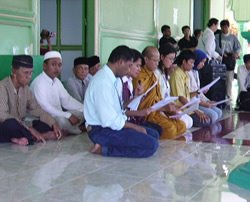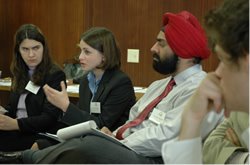Key Achievements of the Religions for Peace 8th World Assembly, Kyoto, August 26-29, 2006
 More than 2000 people including 800 religious leaders from Buddhist, Christian, Hindu, Jain, Jewish, Muslim, Sikh, Shinto and Zoroastrian traditions gathered in Kyoto this August for the 8th Assembly of the World Conference of Religions for Peace.
More than 2000 people including 800 religious leaders from Buddhist, Christian, Hindu, Jain, Jewish, Muslim, Sikh, Shinto and Zoroastrian traditions gathered in Kyoto this August for the 8th Assembly of the World Conference of Religions for Peace.
"Religion has been hijacked by religious extremists, unscrupulous politicians, and the sensationalist media," said Secretary General William F. Vendley in his remarks at the opening ceremony. "Our vehicles of faith must be rescued from the hijackers' grasp. Our religious communities and leaders have to stand fast together, respecting our differences, pooling our collective moral strengths, and building an multi-religious alliance for peace."
The assembly's declarations, recommendations and commitments are very significant and important for religious communities to consider and adopt. In order to help disseminate that information, I will highlight and link key documents. I hope that religious communities will carefully consider these and find ways to implement them.
1. Kyoto Declaration: Delegates issued a multi-religious call to action: "As people of religious conviction, we hold the responsibility to confront violence within our own communities whenever religion is misused as a justification or excuse for violence." It promoted the notion of "shared security" in which all sectors of every society acknowledge common vulnerabilities and assume collective responsibility to address them. The declartion includes 20 recommendations for religious leaders, governments, international organizations, and busiensses to address violence and advance shared security through advocacy, education and partnerships with, and among, religious communities. Clike here for the Kyoto Declaration
2. Statements of Unity from Religious Leaders in Conflict Zones: The assembly created a safe space for religious leaders of these conflict zones to dialogue about the difficult issues of conflict. Shi'ite, Sunni and Kurdish religious leaders from Iraq, Buddhist, Christian and Hindu leaders from Sri Lanka and a delegation from Sudan issued statements of unity following those conversations. Members of the Isralei and Palestinian delegations had critical engagements. There was also a six party consultation on the situation in the Korean Penninsula.
3. Women's and Youth Assemblies: More than 400 participants from 65 countries participated in a Women's Assembly prior to the World Assembly, and adopted a Declation affirming, "women of faith make available strength and hope when all seems hopeless." Click here for the Women's Assembly declaration

Similarly, a Youth Assembly produced its own declaration proclaiming: "We choose hope because that's the only way forward." Click here for the Youth Assembly declaration


0 Comments:
Post a Comment
<< Home